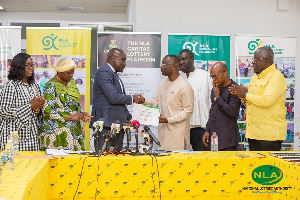 These companies include KGL Technologies, Blue Star Hi-Tech Company Limited, Luma Facilities
These companies include KGL Technologies, Blue Star Hi-Tech Company Limited, Luma Facilities
As part of efforts to enhance the regulation and transparency of lottery activities across Ghana, the National Lottery Authority (NLA) has publicly issued licenses to 15 Private Lotto Operators (PLOs).
This move underscores the NLA’s commitment to fostering a fair and competitive lottery industry.
The public licensing event marks a significant advancement in the regulation of the lottery sector, reflecting the NLA’s ongoing efforts to promote transparency, protect legitimate businesses, and ensure fair competition.
With this latest issuance, the total number of licensed PLOs in Ghana has risen to 23, following the licensing of eight companies earlier this year.
These companies include; KGL Technologies, Blue Star Hi-Tech Company Limited, Luma Facilities and Trading Limited, Zeta Technologies, Fortune Synergy Limited, Afri Lotto Systems Limited, Game Park Limited, and Wulucky Ghana Limited.
The licenses were granted under the NLA Act 2006 (Act 722), the Lottery Regulations 2008 (LI 1948), and the Veterans Administration Ghana (VAG) 2012 (Act 844), setting a new benchmark for lottery operations in the country.
Three companies—Luma Technologies, Rand Lottery, and Alpha Lotto—received 10-year licenses, valid from January 2024 to December 2035, while the remaining 12 companies were granted licenses with terms ranging from two to three and a half years.
The newly licensed companies include Obiri Asare and Sons Company Limited, Zacdow Company Limited, Glovita Lottery Company Limited, and Makafui Mogyi Company Limited, among others.
These companies are authorized to operate the NLA’s original 5/90 Game, which is currently paper-based but is expected to transition to Point of Sale (POS) terminals within the next two years as part of their licensing conditions.
The new licenses also empower these companies to report illegal lottery operators to the NLA or security agencies, further strengthening the fight against unauthorized lottery activities.
NLA Board Chairman, Mr. Gary Nimako, reiterated the authority’s commitment to safeguarding the investments of licensed operators and cracking down on illegal operations.
He issued a stern warning to unlicensed companies to cease operations immediately and directed NLA Director General, Mr. Samuel Awuku, to enforce actions against illegal operators.
Despite the estimated GH¢1.8 billion annual value of Ghana’s lottery industry, the NLA captures only about GH¢800 million, with illegal operators pocketing over GH¢1 billion annually.
Out of approximately 700 illegal lotto companies, mostly in rural areas, only about 20 are registered with the NLA.
During the ceremony, Noah Afornofe, Managing Director of Rand Lottery Limited, spoke on behalf of the licensed PLOs, expressing satisfaction at finally reaching a complete licensing agreement.
Mr. Awuku reassured the licensed companies of the NLA’s commitment to protecting their business interests and warned against writers working for multiple companies.
He also addressed rumours regarding ownership of the charity arm of the NLA, the Good Causes Foundation, and encouraged companies to document their charitable contributions.
Additionally, the NLA instructed the PLOs to enforce the payment of commissions to lotto writers, which has been raised from 20% to 25%.
This adjustment, in accordance with the Lotto Act (Act 722), aims to balance the financial needs of writers with the sustainability of the lottery companies.
Although lotto writers had previously petitioned for a 30% commission, a study showed that the 25% rate was already higher than international standards.
Some private lotto companies have been illegally paying up to 30% commission, a practice the NLA is working to eliminate.
Both Mr. Awuku and Mr. Nimako urged the companies to adhere to the 25% commission rate approved by the NLA, warning that non-compliance could result in the revocation of licenses.
The issuance of these licenses marks a new era in the regulation of Ghana’s lottery industry, with the NLA taking firm steps to ensure that the sector operates transparently and fairly, benefiting all stakeholders involved.